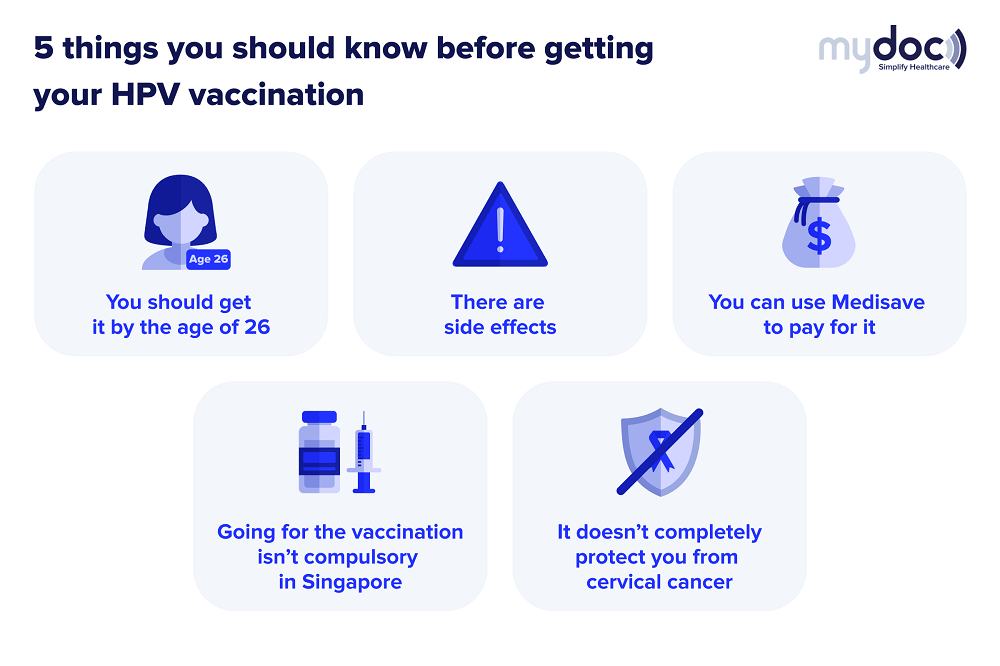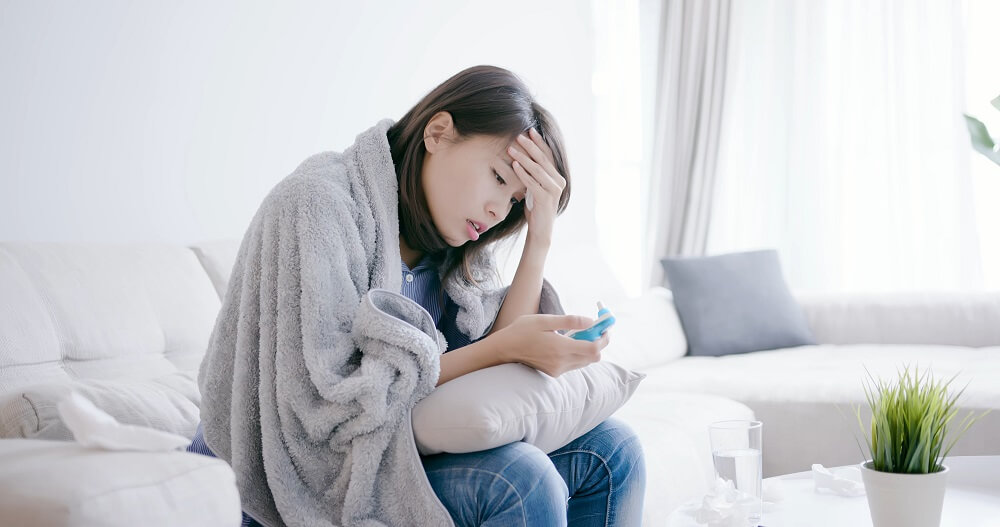Have you gotten your HPV vaccination yet? Chances are your friends and family have been egging you on to get jabbed, and rightly so. In this article, we take a look at what HPV is and what you should know before getting an HPV vaccination in Singapore.
What is HPV and what can HPV vaccination do?
Human papillomavirus, or HPV for short, is one of the most common sexually transmitted infections (STI) in the world. In fact, about 80 percent of people will get an HPV infection in their lifetime.
While most HPV infections don’t lead to serious health problems, persistent infection by certain HPV strains can cause cancer and other diseases over time.
Types of HPV
With over 100 types of HPV strains, HPV is grouped by high-risk strains (cancer-causing) and low-risk strains (non-cancer causing types). Out of these 100 types of HPV strains, about 40 HPV strains can infect the genital area.
Low-risk strains
Low-risk strains are usually asymptomatic, but may lead to genital warts for more serious cases. 90 percent of genital warts are caused by HPV subtypes 6 and 11.
High-risk strains
High-risk HPV strains are commonly associated with genital cancers such as vaginal, cervical and vulvar cancer in women, and anal and penile cancer in men. These are usually caused by HPV subtypes 16 and 18, which are responsible for 70 percent of cervical cancer cases in Singapore.
HPV symptoms and transmission
While some HPV infections may cause genital warts, most HPV infections do not have any symptoms. As such, an infected person may have no visible signs and can have the virus and pass it on unknowingly.
Unlike some STIs that can be prevented by using condoms consistently and correctly, it’s difficult to prevent HPV as it is transmitted through skin-to-skin and sexual contact instead of through bodily fluids. HPV can be transmitted through vaginal, anal and oral sex, and very rarely, during childbirth from an infected mother to her baby.
Fortunately, vaccines exist to help prevent infection from certain types of HPV, including those that are linked to HPV-related cancers. If you’re thinking of getting an HPV vaccination in Singapore, here are some things you should take note.
5 things to know before getting your HPV vaccination in Singapore

1. You should get your HPV vaccination before the age of 26
As HPV infections are most commonly spread through sexual contact with another person, an HPV vaccine is most effective when the course is completed before you become sexually active.
Similarly, under the Singapore National Childhood Immunisation Schedule, female citizens between that age range are encouraged to get vaccinated against HPV.
However, that’s not to say that you can’t get the vaccine after you turn 26 and/or are sexually active. The vaccine can still protect you from contracting HPV strains, although it may be less effective as you may have already been exposed to the strains.
If you’re over 26 and intend to get the HPV vaccination, we recommend chatting with your doctor to find out if you’re suitable.
2. Going for an HPV vaccination isn’t compulsory in Singapore
Though optional, HPV vaccination is still highly recommended by the government. As the saying goes, prevention is better than cure. While HPV vaccination is not a treatment for HPV infections, it is an effective prevention method against possible infections and risks. Studies have shown that there’s no evidence of the protection against HPV strains decreasing over time, even after more than 10 years.
Regular cervical cancer screenings and tests can also help to identify high-risk HPV cancer-causing strains.
Read more about cervical cancer and health screenings in Singapore here.
3. You can use Medisave to pay for your HPV vaccination in Singapore
Many clinics offer HPV vaccination in Singapore. Prices can vary depending on the type of vaccine you’re getting and where you get it.
Getting vaccinated at the polyclinic is an affordable option. However, note that polyclinics only offer Cervarix® — one of the three types of HPV vaccinations available. Cervarix provides the least coverage out of the three. For more protection against other HPV subtypes, you may want to opt for Gardasil® and Gardasil 9®.
To give you a better understanding, here’s a table comparing the three types of HPV vaccines available in Singapore.
| Cervarix | Gardasil 9 | Gardasil | |
| Protect against the following HPV subtypes | 16, 18 | 6, 11, 16, 18 | 6, 11, 16, 18, 31, 33, 45, 52, 58 |
| Approved indications | Prevention of cervical cancer and premalignant cervical lesions caused by HPV types 16 and 18 | Prevention of cervical, vulvar, vaginal and anal cancer caused by HPV types 16 and 18 Prevention of premalignant cervical, vulvar, vaginal and anal lesions caused by types 6, 11, 16 and 18 Prevention of genital warts caused by types 6 and 11 | Prevention of cervical, vulvar, vaginal and anal cancer caused by HPV types 16, 18, 31, 33, 45, 52 and 58 Prevention of dysplastic, premalignant cervical, vulvar, vaginal and anal lesions caused by types 6, 11, 16, 18, 31, 33, 45, 52 and 58 Prevention of genital warts caused by types 6 and 11 |
Credit: Healthhub.sg
Though prices differ according to the type of vaccine you’re getting and where you’re getting it from, the good news is that you can tap into your Medisave account to pay for your HPV vaccination in Singapore.
You can use up to $500 of your Medisave account per year under the Medisave400 scheme to cover your HPV vaccination. However, this only includes Cervarix® and Gardasil®. Gardasil 9® is not covered.
You could also opt to use your immediate family member’s Medisave if you have insufficient funds to pay for it.
4. An HPV vaccination doesn’t completely protect you from cervical cancer
Just like all vaccines, the HPV vaccine does not guarantee 100 percent protection from cancer.
The vaccine only protects against 70 to 90 percent of high-risk HPV strains. There is still a chance that you might be infected with a cancer-causing HPV strain even after being vaccinated.
As cervical cancer can be caused by other HPV strains which vaccines do not protect against, going for regular cervical cancer screenings and tests can also help to detect signs of cancer.
| Age | Best Action | Why |
| Nine to 26 years old | HPV vaccination (best before the first time you have sexual contact) | No exposure to HPV strains |
| 26 to 29 years old | Pap smears | Can detect signs of cancer and abnormal changes in cervical cells |
| Above 29 years old | HPV tests | Can check if your cervical cells contain any DNA with high-risk cancer-causing HPV strains 16 and 18. |
If you’re between the ages of 25 to 29 years old, make pap smears every three years a routine. Once you’ve passed the age of 30, take an HPV test once every five years.
HPV test checks for the presence of any high-risk HPV strains that might not be able to be detected with a simple pap-smear. Having high-risk strains of HPV in your cervical cells may increase the risk of your cells turning abnormal, leading to possible health complications in the future.
5. HPV vaccinations can have side effects

Most people who get an HPV vaccine in Singapore experience little to no side effects after the jab — safe for the mild swelling of the injection area.
However, common side effects from the HPV vaccine include itching, numbness, redness and fever. You might also feel a little faint post-vaccination.
If you experience any of these side effects after your HPV vaccination, inform your doctor.
Getting your HPV vaccination in Singapore
Cancer is one of the leading causes of death in Singapore. Unlike most forms of cancer, cervical cancer is one of the only forms of the illness that can be mitigated with preventive measures such as vaccines.
Now that you’ve read the list of things to take note of before getting an HPV vaccine, you’ll be able to make a more informed decision on whether or not to go ahead with the jabs.
See if you’ve got the facts with this handy pre-vaccination checklist:
| Yes | No | |
| Are you or your child between the ages of nine and 26 years old? – If she is 13 years old, she is eligible for a free HPV vaccination in Singapore. | ||
| Have you or your child been sexually active? | ||
| Do you utilise other preventive measures against HPV? – Regular health check-ups – Routine STD check-ups – Safe-sex methods | ||
| Have you been infected with any strains of HPV? | ||
| Do you have any pre-existing health conditions? | ||
| If you answered yes to three or more of these questions, do consult your doctor before proceeding with an HPV vaccination. |
Getting an HPV vaccination in Singapore is just one of the many ways to look after your sexual health. If you’re sexually active and have been in sexual contact with more than one partner, regular STI and HIV screenings are a great way to maintain your sexual health.
Though sexual health is still a rather taboo topic in Singapore, that shouldn’t stop you from putting your health first.
Chat with the doctors from DTAP about your queries on MyDoc today.

